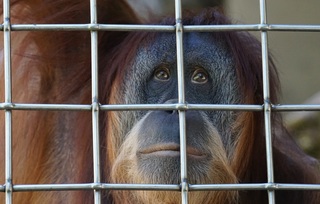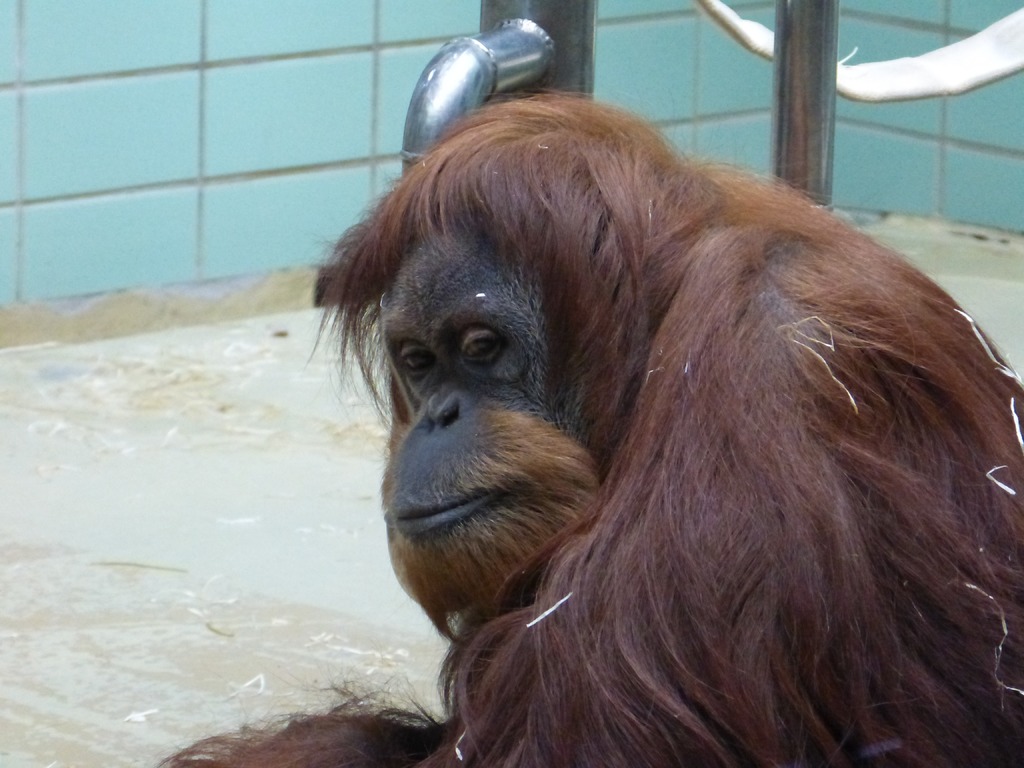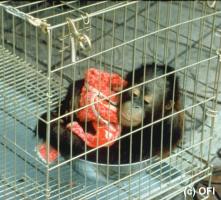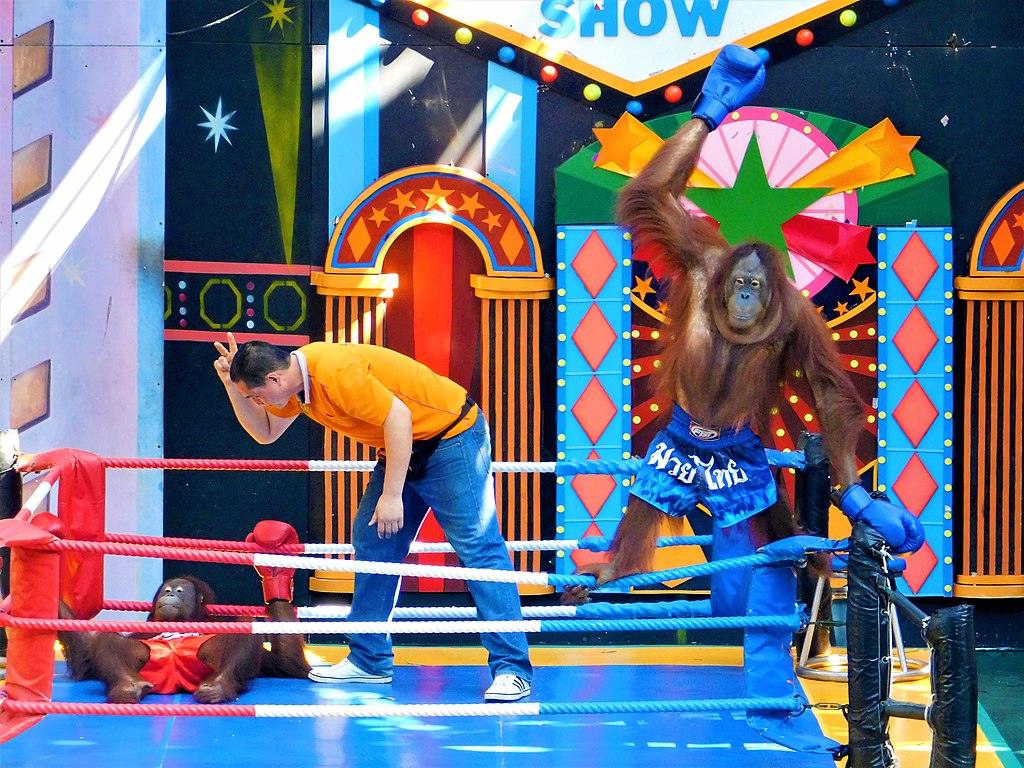While it's been illegal to own or trade orangutans in Indonesia and Malaysia for decades, the orangutan trade continues to flourish.
Most of the illegal trade in orangutans is a byproduct of habitat destruction. As the rainforest is cut down, terrified orangutans have nowhere to go and descend to the ground, where they usually encounter loggers or field workers. These orangutans, who are usually mothers with dependent offspring, are inevitably attacked, killed, and eaten. Their babies are taken from them and either kept as pets or sold into the illegal animal trade.

Most infants don't survive the harsh journey to the wildlife markets in Jakarta, Bali, or other international locations. Poor care, disease, injury and the psychological trauma of losing their mothers means most captive infant orangutans don't survive their first year. It's estimated that for every orangutan that does survive, another six to eight die.
If an orangutan does survive the journey, for the first 2-3 years of their life they will make cute and appealing pets. However, by three or four years old an orangutan will already be as strong as an adult human, and by the time an orangutan is reaching maturity at 10 years old, it will be five to seven times as strong as a male human. At this stage, most owners keep the orangutan permanently caged, kill it, or discard it. The lucky few will be confiscated.
There are currently over 1,500 hundred orangutans in rehabilitation centers in Borneo and Sumatra.
The impact of this trade is discussed in the UNEP Report "Last Stand of the Orangutan."

The illegal wildlife trade has long been one of the most serious threats to protecting endangered species throughout the world. Despite the large amounts of resources spent on combating it and the huge publicity given to the animals most severely threatened by it, the pace of the trade continues unabated. Today, the illegal wildlife trade is one of the world’s most lucrative illegal trades, with a combined value of around $10 billion dollars annually. It's likely the world’s second-largest trade, behind the international drugs trade (Vince, 2002).
Primates are one of the most heavily traded types of wildlife. They're traded for a variety of reasons, including:
Most of the primate trade is illegal, but some species are still traded legally. Historically, the most widely traded primate is the macaque, which is used heavily in biomedical research. Up to 12,000 macaques enter the USA legally every year for use in research (WWF). Long-tailed macaques are still legally exported from Indonesia every year for this purpose (Soehartono & Mardiastuti, 2002).
Chimpanzees, bonobos, gorillas, gibbons, siamangs, and orangutans have long suffered from hunting pressures, and the illegal wildlife trade is one of the biggest threats they face. Chimpanzees have been traded illegally for decades, primarily for use as pets, entertainment, and biomedical research. Trading wild chimpanzees is illegal, and most countries have either banned using great apes in invasive scientific experiments or are moving toward such a ban. Still, there are currently around 2,000 chimpanzees housed in US laboratories. All of them are wild-caught or acquired from circuses, zoos, or private collections (Project R&R). Another 113 are kept as pets in the USA, one of the few countries where keeping a great ape as a pet is legal. Although public pressure has decreased the use of apes in entertainment, one of the most popular and successful advertising campaigns in the UK involved a group of chimpanzees, dressed as humans, drinking tea until 2002. This campaign was voted the nation's favorite in 2003 (The Guardian, 2003). In addition, a pet gibbon recently featured prominently in a successful US comedy series. Throughout South East Asia, orangutans and gibbons are found in tourist areas where they're often forced to participate in boxing matches or drink alcohol and smoke cigarettes in nightclubs. Although proprietors claim these animals are captive born, they are probably poached from the wild (The Daily Mail, 2010).
Perhaps the biggest threat to the great apes of Africa is the increasing trade in the animals for human consumption, known as the bushmeat trade. Communities in Africa living in proximity to forested areas have always hunted chimpanzees, gorillas, and bonobos, and although there are local taboos, their meat has always been a staple of Central African diets. However, with the arrival of modern weapons, population growth, urban sprawl, and the opening up of Africa’s forests by timber companies, the consumption of ape meat has exploded from a pure subsistence activity, into a large commercial enterprise (Peterson, 2001). Today, it is estimated that up to 8,000 chimpanzees, bonobos, and gorillas are killed each year to fuel this industry (Bushmeat Project, 2010).
Orangutans, like all the other great apes, are listed in Appendix I of the Convention on International Trade in Endangered Species (CITES), which prohibits their unlicensed international trade, and, as signatories to CITES, Malaysia and Indonesia are required to adhere to this prohibition. Orangutans are also protected by national laws in both countries, initially introduced during their periods of European colonization, and amended upon independence. They are also members of the ASEAN Wildlife Enforcement Network (ASEAN), and Indonesia is a signatory to the Kinshasha Declaration, which resolves to improve “the protection of individual great apes and their habitats everywhere by demonstrably improving where necessary the quality and enforcement of relevant laws, as well as the capacity of law enforcement agencies” (CITES/GRASP, 2006). Despite this, the trade continues.
The orangutan trade encompasses many forms, but at its heart is the poaching of orangutans from the wild, be it for food, to obtain infants for the pet trade, for traditional medicine or in response to crop raiding (Rijksen & Meijaard, 1999).
One of the most complex issues in orangutan conservation is the hunting of orangutans by local people for food, something conservationists have often shied away from dealing with, for fear of offending local sensitivities. Fossil evidence from the Niah caves of Sarawak in Malaysia indicates humans were killing and eating orangutans as early as 40,000 years ago and, although different cultures have different taboos, the hunting of wild animals for sustenance has been, and still is, an integral part of indigenous cultures and rural life throughout Indonesia and Malaysia, with historic hunting seen as the likely explanation for the large areas of suitable forest habitat throughout Borneo currently devoid of wild orangutans (Bennett, 1998; Rijksen & Meijaard, 1999).
The introduction of both Christianity and Islam to the region has seen a modification in the beliefs and practices of many of the indigenous people, and today, most Muslim communities generally refrain from eating orangutan meat. However, there is still a large local variation in this activity, and whether or not orangutans are hunted is strongly linked with tribal and village identity (Marshall et. al., 2006). Surveys in Kalimantan have shown that hunting for meat claims the lives of around a thousand orangutans a year, and studies have found that sustenance hunting was the primary factor reducing orangutan density in areas of Kalimantan, that orangutans were being killed not just for their meat, but for their perceived medicinal benefits of their body parts, and that any drop in the levels of hunting was due to the scarcity of orangutans today, rather than to any change in beliefs (Mongabay, 2010; Marshall et al., 2006).
Research conducted by CITES and the Great Ape Survival Project (GRASP) in 2006 found that although the hunting of orangutans for their meat was not as widespread throughout Indonesia as the bushmeat trade is throughout Africa, orangutans are still widely hunted, and in some rural areas, some restaurants would prepare dishes containing orangutan meat, although these dishes would have to be specifically requested and would not be offered openly. They also found that orangutan fat and skin is used as a form of talisman to protect houses against fire.
Land conflict between wildlife and humans is not a new phenomenon and has occurred throughout the world since time immemorial. As a consequence of this conflict with population expansion and technology, the killing by humans has caused the extinction, or near extinction, of most large predators throughout Europe, North America, and Australia. In the developing world, where large areas of tropical rainforest have been converted into agricultural land, such conflicts are an increasing problem. Although conflicts usually occur with larger, ground-dwelling animals like elephants and tigers, as the rate of deforestation in Indonesia and Malaysia has increased, so have human-orangutan conflicts, as starving displaced orangutans raid crops and wander into villages in search of food, where they are usually killed. One palm oil company in Central Kalimantan instigated a policy of paying local people 150,000 Rupiah (around $17) for every orangutan ‘pest’ killed (Buckland, 2005). In addition, although a local NGO was able to form an agreement with this company in 2004 to rescue 52 adult and 11 infant orangutans found in their plantation, it is likely that similar policies are in place in most other plantations. As firearms are not easily available, most orangutans in these situations are either beaten, hacked, drowned, set on fire, or buried alive (Schuster, 2007).
The illegal pet trade is one of the biggest threats to orangutans and is comprised of two components: the domestic market and the international market. The practice of keeping pets is widespread in many parts of Indonesia, and wildlife markets are a feature of most large towns and cities. Although illegal, the keeping of primates as pets is common (CITES/GRASP, 2006), and these primates, most often orangutans and gibbons, will often be kept by families, in good conditions, in the same way, people in western countries keep cats and dogs. In some circumstances, orangutans are also kept as status symbols, indicating an owner’s social status or wealth. Orangutans are also acquired by people for the sole reason of being illegal, and therefore a way for the owner to demonstrate that he or she is above the law. Investigations in Sumatra have shown that possession of orangutans is usually by local politicians, senior military and police staff, and many of the orangutans confiscated by the police and junior military will be used to curry favor with higher-ranking officials, with 60% of all orangutans in rehabilitation centers on the island having come from such sources (Ibid).
Like all great apes, orangutans have slow life histories, and for the first few years of their lives, are docile, sweet and gentle. However, at about five years old, an orangutan already has the strength of an adult male human. When it is mature, it will be as strong as five to seven adult male humans, with an unpredictable and possibly aggressive nature that makes them unsuitable as pets.
 The only way for an orangutan baby to be caught is for the mother to be shot, and the baby pried from her dead body. The route the baby then takes is entirely dependent on the intended form of trade, and how much money can be obtained. Almost every person living in a forested area of Kalimantan will know the value of a baby orangutan, so while poachers will sometimes keep orangutans for themselves, usually if the baby is kept by the poacher, or sold to a family in the same village, it is because the orangutan is a valuable commodity that can in time be sold or bartered (Nijman, 2005). Rather than being kept, it is more likely that the baby will enter the illegal trade, usually sold to someone in another area, who will then sell it on for an increased price; the process becomes more and more professional and lucrative as it develops. The monetary value of an orangutan varies from place to place and depends on whether it is being sold in an area where orangutans live in the wild. For example, in Kalimantan, orangutans can be priced between 243,000-1,007,000 Rupiah ($27-$112), while on the island of Java, orangutans will cost more, from 3,462,000 Rupiah ($385). Orangutans are also often acquired in exchange for other commodities, such as a wristwatch or an electronic appliance (Nijman, 2005).
The only way for an orangutan baby to be caught is for the mother to be shot, and the baby pried from her dead body. The route the baby then takes is entirely dependent on the intended form of trade, and how much money can be obtained. Almost every person living in a forested area of Kalimantan will know the value of a baby orangutan, so while poachers will sometimes keep orangutans for themselves, usually if the baby is kept by the poacher, or sold to a family in the same village, it is because the orangutan is a valuable commodity that can in time be sold or bartered (Nijman, 2005). Rather than being kept, it is more likely that the baby will enter the illegal trade, usually sold to someone in another area, who will then sell it on for an increased price; the process becomes more and more professional and lucrative as it develops. The monetary value of an orangutan varies from place to place and depends on whether it is being sold in an area where orangutans live in the wild. For example, in Kalimantan, orangutans can be priced between 243,000-1,007,000 Rupiah ($27-$112), while on the island of Java, orangutans will cost more, from 3,462,000 Rupiah ($385). Orangutans are also often acquired in exchange for other commodities, such as a wristwatch or an electronic appliance (Nijman, 2005).
Orangutans are also often poached from the wild to form collections for zoos and wildlife parks throughout the country. The origins of the orangutans and other primates kept in these zoos are often uncertain, and records are not always kept, but it is likely few are captive-born. Conditions at these zoos are usually appalling, and have a high mortality rate. Of the six orangutans present at the Medan Zoo in Sumatra in 2006, only two were still there in 2008 (Nijman, 2009).
The international trade in orangutans is strictly prohibited, but despite its illegality, research into the illegal wildlife trade in Kalimantan and Sumatra has shown that orangutans are still being smuggled out of Indonesia into neighboring southeast Asian countries (Nijman, 2005; CITES/GRAS, 2006). Performing orangutans have always been extremely popular in South East Asia, and the similarities between infant orangutans and human babies have always made them popular household pets (Foead et. al., 2005). In the 1980s and 1990s, the illegal trade was focused mainly in the affluent country of Taiwan, where demand for orangutan pets was high, and where an estimated 1,000 orangutans were illegally imported between 1985 and 1990 (WWF). In recent years, the large numbers of orangutans in Thailand and Cambodia have brought renewed attention to the wildlife trade, and their use in highly publicized kickboxing shows, aimed at domestic and international, usually Western tourists, has been the focus of intensive lobbying by NGOs.

In 2004, 114 orangutans were seized from the Safari World theme park in Bangkok, where they were forced to dress up and engage in Thai-boxing, and in 2006, 54 of these orangutans were returned to Indonesia. Unfortunately, the other 60 were believed to have died (Profauna, 2006). Despite the safari park being ordered to close, media reports surfaced in 2010 showing the park open and once again advertising orangutan boxing shows (The Daily Mail, 2010). Orangutans are kept in similar parks in other areas of Thailand and Cambodia (Davies, 2005), with further groups of illegally imported orangutans known to exist in peninsular Malaysia, Saudi Arabia and Vietnam (CITES/GRASP, 2006). Like the domestic trade, these orangutans are poached from the rainforests, and transported to coastal towns, where they are often sold to crews of foreign-owned ships, and, through a system of corruption, bribes, and collusion, clear customs easily. Intelligence related to the illegal importation of one large shipment of orangutans from Kalimantan to Cambodia showed that a Thai fishing vessel had been involved, and cargo ships are known to transport orangutans from the coastal city of Pontianak in west Kalimantan to Singapore (CITES/GRASP, 2006; Nijman, 2005).
It's difficult to estimate the number of orangutans involved in the illegal domestic and international wildlife trade, or those lost to sustenance hunting, but it's evident that it's a considerable number. Forestry Department officials confiscated 1,433 orangutans in Kalimantan between 1971 and 2004 (Nijman, 2005). Between 1973 and 2000, 226 orangutans were rescued and handed to the largest rehabilitation centre in Sumatra (Nijman, 2009). These numbers are probably just a drop in the ocean, but it's clear that if orangutans in Malaysia and Indonesia are to survive, stronger law enforcement is needed, and current domestic and international laws and treaties banning this trade are enforced.
Bennett, E. (1998). The natural history of the orangutan. Natural History Publications (Borneo).
Buckland, H. (2005). The oil for ape scandal. Friends of the Earth, UK.
Bushmeat Project. (2010). The Bushmeat Crisis. Bushmeat Project, UK.
CITES/GRASP. (2006). CITES/GRASP orangutan technical mission Indonesia. CITES/GRASP.
Davies, B. (2005). Black market. Inside the endangered species trade in Asia. Earth Aware Editions, USA.
Foead, N., Elliott, W., Ziegler, S., Van Gool, M. & Nijman, V. (2005). WWF’s species action plan for the conservation of orangutans in the wild.WWF's Species Action Plan, UK.
Marshall, A.J., Nardiyono., Engstrom, L.M., Pamungkas, B., Palapa, J., Meijaard, E. & Stanley, S.A. (2006). The blowgun is mightier than the chainsaw in determining population density of Bornean orangutans (Pongo pygmaeus morio) in the forests of East Kalimantan. Biological Conservation, 129, pp. 566-578.
Meijaard E. (2010). Indonesian people-not international donors or orangutan conservationists-will determine the ultimate fate of Indonesia's forests. Mongabay.com.
Nijman, V. (2005). Hanging in the Balance. An assessment of trade in orangutans and gibbons in Kalimantan, Indonesia. TRAFFIC, Southeast Asia.
Nijman, V. (2009). An assessment of trade in orangutans and gibbons in Sumatra, Indonesia. TRAFFIC, Southeast Asia.
Peterson, D. (2001). Eating apes. University of California Press, USA.
ProFauna. (2006). Indonesia welcomes home orangutans. Profauna.
Rijksen H. & Meijaard E. (1999). Our vanishing relative. The status of wild orangutans at the turn of the 20th century. Kluwer academic Publishers, Netherlands.
Schuster, G. (2007). Thinkers of the jungle. Tandem Verlag GmbH, Germany.
Soehartono, T. & Mardiastuti, A. (2002).CITES implementation in Indonesia. CITES.
The Daily Mail. (2010). Orangutans kickbox and parade in bikinis for cheering tourists. The Daily Mail.
UNEP. Last Stand of the Orangutan. http://www.unep-wcmc.org/last-stand-orangutan_127.html.
Vince, G. (2002). Organized gangs target wildlife trade. New Scientist.